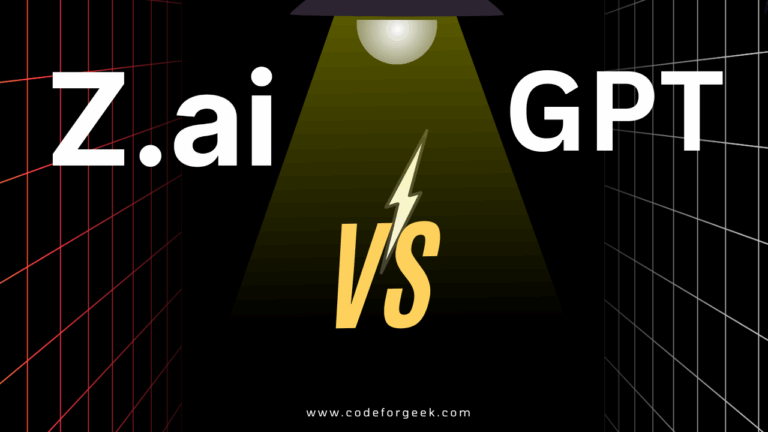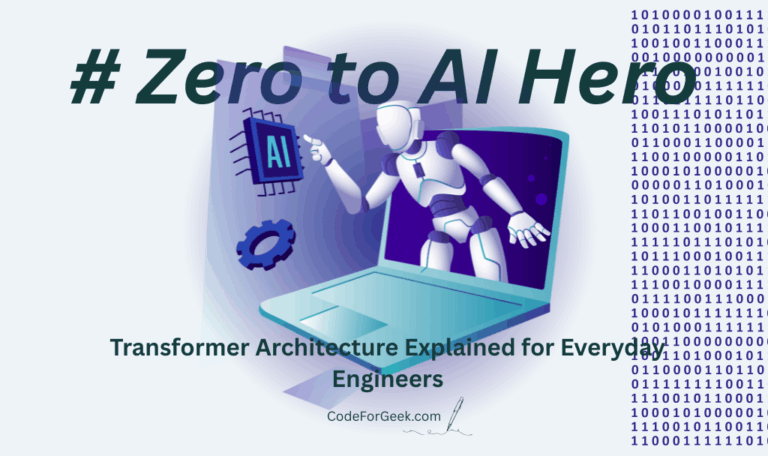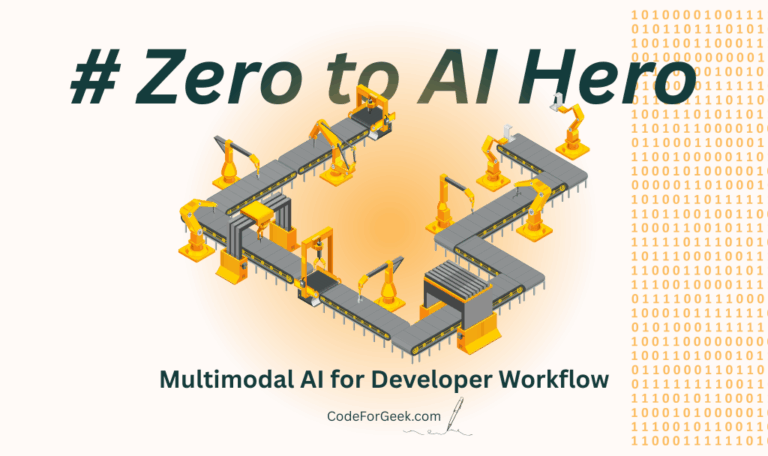New to Rust? Grab our free Rust for Beginners eBook Get it free →
What Are AI Agents? The Easiest Explanation
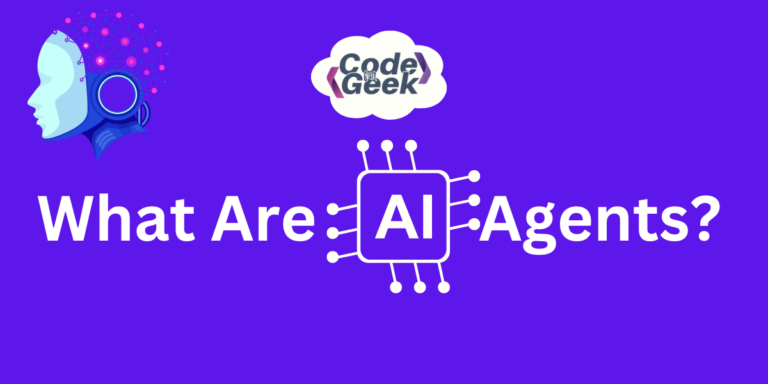
Artificial intelligence (AI) has evolved a great distance, far beyond mere rule-based computer programs to sophisticated systems that can make choices independently. Arguably, the most interesting new AI innovation is the idea of AI agents. These are stand-alone computer programs that can deal with their world, collect information, choose what to do next, and perform actions in order to get things done with little human intervention.
In this article, we’ll explain what AI agents are, how they work, and why they’re important—all in plain, easy-to-understand language.
Introduction to AI Agents
AI agents are advanced computer systems that act upon a user’s behalf. They do so by:
- Operating in its world, an AI agent gathers information from numerous sensors and software interfaces.
- In data processing, it uses machine learning algorithms or predefined rules to understand the context under consideration.
- Based on the analysis, the agent decides what to do.
- The agent then goes ahead and performs the task in question—whether it is sending an email, updating a database, or even instructing a robot.
In simple words an AI agent:
- Perceives its environment (through data inputs).
- Processes information using AI.
- Acts to achieve a goal (e.g., answering a question).
Key Features of an AI Agent
AI agents have a variety of unique properties that make them different from traditional software programs:
- Autonomy: AI agents are made to act independently. Once assigned a goal or mission, they are able to determine the optimal course of action to accomplish that goal without human input. For example, a chatbot resolves customer queries without human help.
- Rational Decision-Making: They make decisions based on facts and have objectives. In short, they are “rational” in the sense that they choose actions most appropriate to drive them towards their set objectives. They use AI algorithms (like ChatGPT) to analyze data and choose actions.
- Learning Ability: There are several AI agents that possess intrinsic learning mechanisms. This enables them to adapt in the long term, learning from past experience and improving their methods based on feedback. Netflix’s recommendation system learns your preferences to suggest shows.
- Adaptability: AI agents have the capacity to adjust to changes of their environment. For instance, if conditions are changed or new information arises, the agent can restructure its activities accordingly.
- Interactivity: They are able to communicate with other software systems, databases, and even occasionally with humans. This makes them extremely useful for automating sophisticated workflows like Alexa setting reminders.
- Scalability: AI agents work on a scale that is literally not possible for human employees. They have the power to quickly process large amounts of data and perform tasks on multiple systems simultaneously. They “sense” their environment using inputs like text, voice, or sensors.
AI Agent Architecture – How It Works
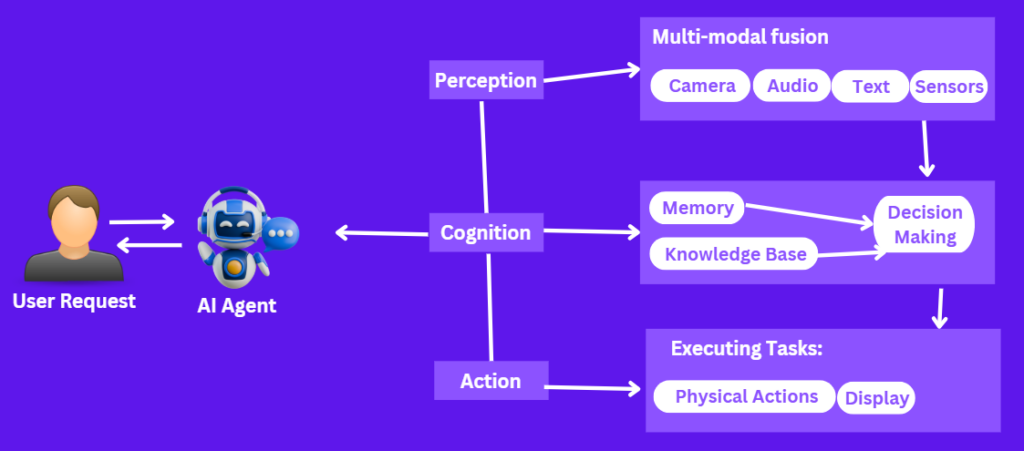
Understanding how an AI agent is constructed allows us to see how such systems function overall. The following are the components:
1. Architecture
The architecture is the base of an AI agent. It can be:
- Physical: In robots, sensors (microphones, cameras), actuators (robotic arms, motors), and controllers fall under these.
- Software-based: For virtual agents, this can include a text interface, APIs, and databases.
2. Agent’s Role
This is a critical part that dictates how the agent translates data gathered into actions. The agent function takes in inputs (data, sensory inputs) and uses algorithms and machine learning models to decide.
3. Agent Program
This is how the agent function operates. It is actual software code that is constructed, trained, and utilized in the system. The program consists of:
- Rules and Logic: Formulated guidelines directing decisions.
- Learning Modules: These are methods that help the agent learn from feedback.
- Action Controllers: Pieces that execute the chosen actions.
4. Feedback Mechanism
Once the task is done, the agent verifies the outcome against what is wanted or intended. This feedback process is extremely important for improvement and adaptation on a continuous basis. The entire process is usually taken to be a loop. The agent keeps receiving new information, making decisions, performing actions, and updating its plan with the result.
Why Are AI Agents Important?
- Efficiency: Execute routine tasks 24/7 (i.e., chatbots).
- Accuracy: Minimize human mistakes in data-intensive work (e.g., medical diagnosis).
- Scalability: Process numerous tasks concurrently (e.g., handling online orders).
- Personalization: Customize experiences (e.g., Spotify playlists).
Real-World Applications of AI Agents
AI agents are used in numerous various industries. Some basic real-world examples are:
1. Customer Support
An AI contact center agent helps customers by reading through their questions, looking up useful information in a database, and answering them. If the question is too complex, it can transfer the problem to a human agent. It reduces response times and lessens the burden on human support staff.
2. Autonomous Vehicles
Autonomous cars use AI to read information from cameras, sensors, and radar. The systems rapidly decide on steering, acceleration, and braking to travel safely. It improves road safety and leads to the development of complete autonomous transport systems.
3. Financial Services
In algorithmic trading, AI agents monitor market conditions and place trades themselves. They are able to observe market information much faster than a human and modify trading strategies based on available information. It enhances trading and aids in making financial decisions.
4. Healthcare
Healthcare AI assistants may be used to examine patient information to help find health conditions, suggest therapies, or set up appointments. It streamlines administrative tasks and assists healthcare providers with information that has been quantified.
5. Smart Home Automation
Your home can have an AI assistant that will automatically set lighting, temperature, and security levels depending on your daily schedule and climatic conditions. It increases comfort, conserves energy, and offers customized living conditions.
Difference Between AI Agents, AI Assistants, and Bots
| Feature | AI Agent | AI Assistant | Bot |
| Autonomy | High (acts independently) | Moderate (follows commands) | Low (follows strict rules) |
| Learning Ability | Yes (improves with experience) | Limited (updates manually) | No (static programming) |
| Complexity | Handles complex tasks | Simple to moderate tasks | Simple tasks only |
| Examples | Self-driving cars, ChatGPT | Siri, Google Assistant | Spam filters, Chat scripts |
Conclusion
As technology advances, we can expect AI agents to get smarter and smarter, making it harder to tell whether humans or machines are working together. They can look at information, form plans, and execute tasks without help, not only saving time and capital but also allowing companies to grow and improve customer service. Whether you are a business leader, a coder, or just interested in the future of technology, AI agents illustrate how artificial intelligence can be applied to create new ideas, improve efficiency, and change things in the 21st century.
If you are more into AI content, check out the following:
- DeepSeek vs ChatGPT: Which Is the Best AI Chatbot in 2025?
- Gemini vs ChatGPT: Free and Paid Version Comparison 2024
- Perplexity vs. ChatGPT: A Comprehensive AI Comparison 2024

